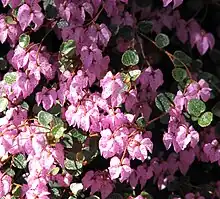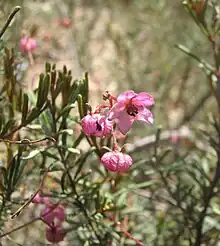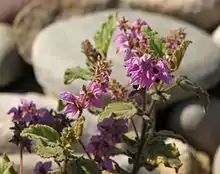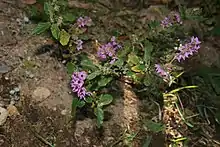Thomasia
Thomasia is a genus of thirty-one species of flowering plants in the family Malvaceae. Plants in this genus are small shrubs that are endemic to the south-west of Western Australia, apart from T. petalocalyx that is native to Victoria and South Australia. The leaves are simple with leaf-like stipules at the base of the petiole, the flowers bisexual with five papery, petal-like sepals, usually five petals and five stamens opposite the petals. The fruit is a capsule covered with star-like hairs.[2][3][4]
| Thomasia | |
|---|---|
 | |
| Thomasia pygmaea | |
| Scientific classification | |
| Kingdom: | Plantae |
| Clade: | Tracheophytes |
| Clade: | Angiosperms |
| Clade: | Eudicots |
| Clade: | Rosids |
| Order: | Malvales |
| Family: | Malvaceae |
| Subfamily: | Byttnerioideae |
| Tribe: | Lasiopetaleae |
| Genus: | Thomasia J.Gay[1] |
| Species | |
|
See text. | |
| Synonyms[1] | |
| |
Taxonomy
The genus Thomasia was first formally described in 1821 by Jaques Étienne Gay in Mémoires du Muséum d'Histoire Naturelle.[5][6] The name Thomasia honours Pierre Thomas, his son Abraham, and Abraham's sons Philippe, Louis and Emmanuel, a family of Swiss plant collectors.[6][7]
Species list
The following is a listed of Thomasia species recognised by the Australian Plant Census as at December 2020:[8]
- Thomasia angustifolia Steud. - narrow-leaved thomasia
- Thomasia brachystachys Turcz.
- Thomasia cognata Steud.
- Thomasia dielsii E.Pritz.
- Thomasia discolor Steud.
- Thomasia foliosa J.Gay
- Thomasia × formosa Paust
- Thomasia gardneri Paust - Mount Holland thomasia
- Thomasia glabripetala S.J.Patrick
- Thomasia grandiflora Lindl. - large-flowered thomasia
- Thomasia macrocalyx Steud.
- Thomasia macrocarpa Endl. - large-fruited thomasia
- Thomasia microphylla Paust
- Thomasia montana Steud. - hill thomasia
- Thomasia multiflora E.Pritz.
- Thomasia paniculata Lindl.
- Thomasia pauciflora Lindl. - few-flowered thomasia
- Thomasia petalocalyx F.Muell. - paper flower
- Thomasia purpurea (Dryand.) J.Gay
- Thomasia pygmaea (Turcz.) Benth. - tiny thomasia
- Thomasia quercifolia (Andrews) J.Gay - oak-leaved thomasia
- Thomasia rhynchocarpa Turcz.
- Thomasia rugosa Turcz. - wrinkled leaf thomasia
- Thomasia rulingioides Steud.
- Thomasia sarotes Turcz.
- Thomasia solanacea (Sims) J.Gay
- Thomasia stelligera (Turcz.) Benth.
- Thomasia tenuivestita F.Muell.
- Thomasia tremandroides Paust
- Thomasia triloba Turcz.
- Thomasia triphylla (Labill.) J.Gay
References
- "Thomasia". Australian Plant Census. Retrieved 9 March 2022.
- Short, Philip Sydney. "Thomasia". Royal Botanic Gardens Victoria. Retrieved 11 December 2020.
- "Thomasia". FloraBase. Western Australian Government Department of Biodiversity, Conservation and Attractions.
- "Thomasia". State Herbarium of South Australia. Retrieved 11 December 2020.
- "Thomasia". APNI. Retrieved 11 December 2020.
- Gay, Jaques E. (1821). "Monographie des Cinq Genres de Plantes, Lasiopétalées". Mémoires du Muséum d'Histoire Naturelle. 7: 450–452. Retrieved 11 December 2020.
- Sharr, Francis Aubi; George, Alex (2019). Western Australian Plant Names and Their Meanings (3rd ed.). Kardinya, WA: Four Gables Press. p. 118. ISBN 9780958034180.
- "Thomasia". Australian Plant Census. Retrieved 11 December 2020.


